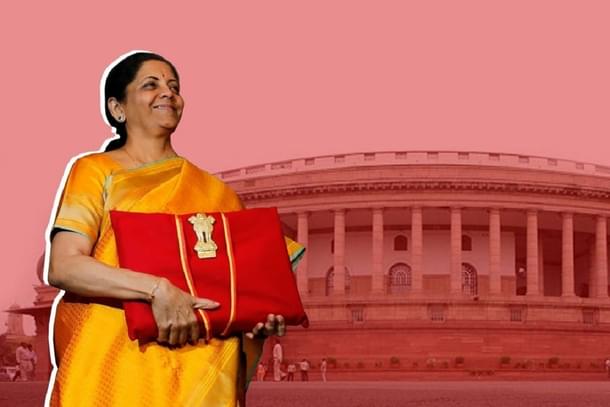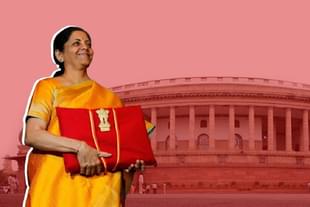Economy
10 Ideas For Finance Minister Before Budget 2022-23
R Jagannathan
Dec 22, 2021, 12:41 PM | Updated 12:40 PM IST
Save & read from anywhere!
Bookmark stories for easy access on any device or the Swarajya app.


With the 2022-23 Union Budget barely more than a month away, Finance Minister Nirmala Sitharaman has her work cut out. It is a pity that every full budget presented by her was dogged by Covid, making nonsense of many budgetary provisions, especially on the revenue and expenditures front.
The next year’s budget is being presented against the Omicron threat, which, according to the SUTRA Consortium, could peak around late February, and decline by April. Luckily, the projection (you can view it on YouTube here), which assumes the worst-case scenario of vaccines providing no protection against Omicron and 25 per cent reinfections for those who have already suffered one round of Covid, indicates a peak infection rate of around 1.8 lakh cases a day by February-end. Compare that with the over four lakh cases daily in this year’s Delta wave peak. Omicron should peak in this financial year itself, and so the next budget may be relatively safe (fingers-crossed).
While Omicron potential for trouble is still not fully understood — we don’t know if it can cause worse damage to lives and livelihoods — there is a reasonable chance that it will not disrupt the economy as badly as the first wave, and much less than the second one.
The first and biggest message for the Finance Minister is thus the same as what the SUTRA Consortium has assumed: assume the worst, and present a conservative budget with enough in-built flexibility to step on the gas as soon as we see Omicron walking off into the sunset. Also, the budget would do well to focus on long-term changes that bring stability to the budget-making process itself.
Here are nine other things I would like to see in the coming budget.
One, focus on the efficacy of spending, not so much on revenues. The general public and the media tend to focus on tax changes rather than what those revenues are supposed to do for the economy when they get spent. The Finance Minister has sent letters to all major ministries to focus on capex spending this year. But it is time to set up a full-time panel comprised of representatives of major ministries and the Finance Ministry that is dedicated to this task all through the year, with reports coming in every month. Expenditure management is the Finance Ministry’s most important task, and this task can no longer be done as an after-thought or quarterly. It has to be done every day, every week, every month. One option could be to institute a method of automatic cuts in budget allocations to a ministry if, after each quarter, it is found to be lagging in capex spending, unless there are extraordinary reasons for the delays. This way all ministries will bring greater rigour to the spending process, instead of rushing to spend towards the end of the year.
Two, the Finance Minister would do well to announce a gradual shift to accrual-based accounting. Right now, budget accounts are cash-based, and do not give a proper picture of the fiscal position. The revenues still to come in and expenditures incurred but not spent at the time of budget making are not properly captured in the accounts. An accrual-based system of accounting is vital for the Finance Ministry, and would help with the shift to better expenditure monitoring mechanisms as well.
Three, basic income tax exemptions and deductions should be inflation-indexed. Currently, we have a system where exemption limits are set every year — or not changed at all. Politicians love this system since this way exemptions can be timed closer to election dates, but it is not a stable system. Whether it is the basic tax-free income limit or the limits for 80C deductions, inflation makes nonsense of them every year. An index-linked system of tax exemptions and deductions will allow citizens to be spared higher taxation resulting purely from inflation.
Four, capital gains taxes — both long-term and short-term — should be aligned and simplified. Currently, long-term capital gains are taxed at different rates for different holding periods. It is 10 per cent for gains (above Rs 1 lakh) from equity or equity funds after one year, 10 per cent (without indexation) or 20 per cent with indexation for debt fund gains after three years, 20 per cent (after indexation) on land and immovable property after two years (but three years for movable assets like gold or jewellery), and 15 per cent for short-term gains on equity bought or sold after paying the securities transaction tax and for equity funds held for under a year. Why not simplify this rule to a flat 15 per cent tax on all assets, whether long-term or short-term, but with all long-term assets getting indexation benefits after, say, two years? The current capital gains law does not make for simplicity.
Five, the case for surcharges and cesses on income tax is growing weaker with every passing year. Quite apart from the fact that states get no share from surcharges, the point is this: any surcharge that remains on the statute book for years on end becomes a part of effective tax rate, and so it is nothing more than an accounting fudge. The budget should announce that no surcharge will henceforth be levied for periods beyond six months, after which they will automatically lapse. And surcharges should be imposed only if there is a proximate and extraordinary reason for them (wars, Covid catastrophe, etc). Existing surcharges should thus be phased out by 2023-24, the last year of Narendra Modi’s second tenure.
Six, the case for bringing petroleum under the goods and services tax (GST) regime has never been stronger. The reason why no state is willing to accept this shift is because of the highly inelastic nature of revenues from this source. Last year (2020-21), states earned Rs 2.02 lakh crore from taxing petro-products, while the Centre earned twice as much. Putting petro-goods under GST would mean both Centre and state forgoing these revenues for an uncertain revenue future. The way forward could be to put petro-goods in the top GST slab (28 per cent) and enable both Centre and states (through a constitutional amendment, if needed) to levy carbon taxes that would act as a flexible source of revenue over and above GST. This would improve the GST structure, and allow states to retain revenue flexibility till they are more comfortable with GST and the carbon taxes can be rationalised.
Seven, the 2022-23 budget must begin the process of introducing an inheritance tax (or estate tax), even if no tax is immediately imposed. The most iniquitous of taxes is the one that is not levied at all on the rich. When India abolished wealth taxes and estate duties in the 1980s, it did not replace them with a sensible and easily collectible inheritance tax. The case for an inheritance tax is straightforward: what one gets as inheritance, and when that wealth crosses a reasonable threshold, it is essentially unearned, untaxed income for those who did not contribute anything to its creation.
A simple Inheritance Tax 101 would allow for decent cash exemptions, a tax-free home for every direct inheritor, and a state-controlled asset management company to take over a percentage of the remaining movable and immovable properties in proportion to the proposed inheritance tax rate. Shares needed for control can be retained with the inheritors for, say, 10 years, with economic rights being transferred to the asset management company. A discussion paper on the way forward with inheritance taxes would be useful both to prepare the rich for the new tax, and to ensure a smooth transition.
Eight, the divergence between corporate and personal income tax rates cannot endure for long. Or else, individuals with high tax rates will shift incomes to corporations owned by them. A five-year plan to converge personal tax rates towards corporate ones (now in the 15-25 per cent range) should be announced in the budget.
Nine, budget speeches should be shorter. It is good that last year’s budget speech was shorter than the 14,000-15,000 talkathons by previous finance ministers, but the ideal speech length would be not more than 5,000-6,000 words, with the details being relegated to annexures and appendices. There is pressure from most ministries to include a paragraph or two about them in the budget, but there is no reason why these should not be given as appendages, or announced separately by the individual ministers themselves after the main budget speech is made in Parliament. This way, the main budget speech with be short and crisp, and politically and economically focused.
Jagannathan is former Editorial Director, Swarajya. He tweets at @TheJaggi.





